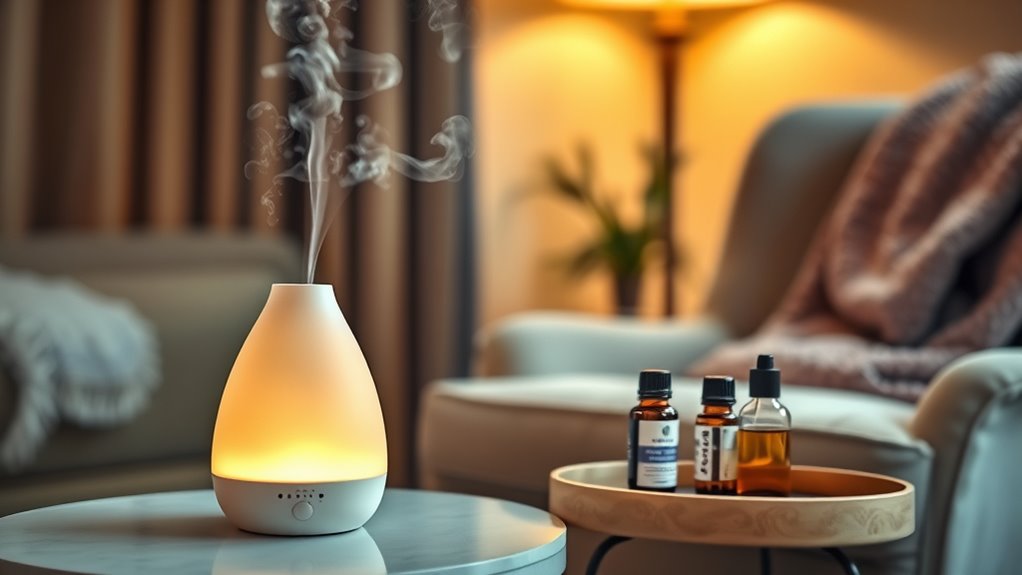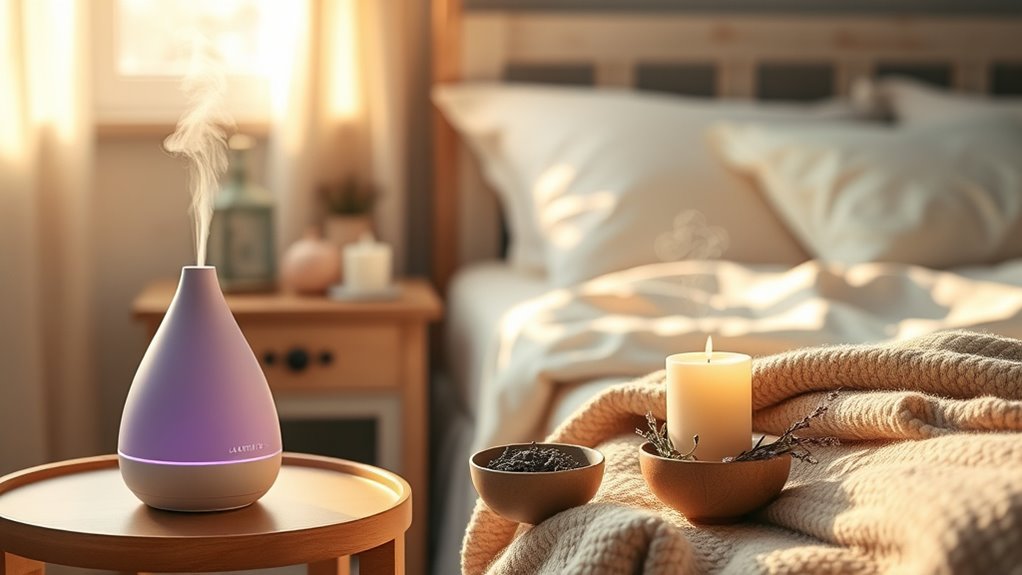Aromatherapy plays a key role in promoting relaxation and better sleep by using essential oils that interact with your limbic system, helping to reduce stress, lower heart rate, and ease muscle tension. Diffusing calming scents like lavender or chamomile creates a peaceful environment for winding down. With consistent use, incorporating aromatherapy into your routine can markedly improve your mental and physical well-being, setting the stage for restful sleep—you’ll discover more ways it can help as you continue exploring.
Key Takeaways
- Aromatherapy interacts with the limbic system to trigger relaxation responses, reducing stress and promoting sleep.
- Essential oils like lavender and chamomile diminish anxiety and tension, aiding in relaxation and better sleep quality.
- Diffusing calming oils creates a tranquil environment that encourages winding down and preparing for restful sleep.
- Incorporating essential oils into routines, such as baths or massage, enhances mental calmness and physical relaxation.
- Regular use of high-quality essential oils helps develop stress management habits, supporting overall sleep health.

Aromatherapy has gained popularity as a natural way to promote relaxation and reduce stress. When you incorporate essential oils into your routine, you tap into a centuries-old practice that can help calm your mind and soothe your body. These concentrated plant extracts are known for their therapeutic properties, especially when it comes to stress relief. Whether you’re winding down after a long day or preparing for sleep, the right essential oils can create an environment that encourages tranquility.
Aromatherapy offers a natural way to promote relaxation and soothe your mind and body.
You might find that diffusing essential oils like lavender, chamomile, or bergamot in your space helps diminish feelings of anxiety and tension. When you breathe in these aromatic compounds, they interact with your limbic system—the part of your brain responsible for emotions and memories. This interaction can trigger a relaxation response, lowering your heart rate and easing muscle tension. As a result, you feel more at ease, making it easier to let go of daily worries.
Using essential oils for stress relief isn’t limited to diffusers. You can also add a few drops to a warm bath or create a calming massage oil blend. When you massage these oils into your skin, the absorption works directly with your nervous system to promote a sense of calm. This multi-sensory experience not only relaxes your muscles but also shifts your mental state towards relaxation. It’s an active way to care for yourself, turning simple routines into therapeutic moments.
As you explore different essential oils, you might notice that some work better for your relaxation needs than others. Lavender, for example, is renowned for its calming effects, while citrus oils like orange and grapefruit can lift your mood and reduce stress. Blending these oils or using them individually allows you to customize your relaxation experience. Keep in mind, the quality of your essential oils makes a significant difference—pure, therapeutic-grade oils deliver the best stress-relief benefits.
Incorporating aromatherapy into your daily routine can be as easy as setting up a diffuser in your bedroom or keeping a small bottle of your favorite oil nearby. Over time, you’ll likely find that regular use helps you manage stress more effectively and creates a peaceful environment conducive to sleep. The key is consistency—by making aromatherapy a part of your self-care, you give yourself a natural, soothing tool to combat stress and foster restful sleep. Additionally, selecting high-quality essential oils ensures you experience the full therapeutic potential of aromatherapy.

Magicteam White Noise Machine with 20 Non Looping Natural Soothing Sounds Memory Function 32 Levels of Volume Powered by AC or USB and Sleep Sound Timer Therapy for Baby Kids Adults Black
❤20 Non-Looping Sleep Sounds: White noise ,Brown noise, pink noise, blue noise, fan,brook, rain, ocean,bird and Bonfire,suitable for...
As an affiliate, we earn on qualifying purchases.
Frequently Asked Questions
Can Aromatherapy Replace Traditional Sleep Medications?
Aromatherapy can’t fully replace traditional sleep medications, but it can be a helpful natural remedy for relaxation and improving sleep quality. You might find it a suitable medical alternative or supplement, especially if you’re seeking gentler options. While it doesn’t work for everyone or all sleep issues, incorporating essential oils like lavender can promote calmness and support better sleep without the side effects associated with medications.
Are There Any Safety Concerns With Long-Term Aromatherapy Use?
Long-term safety with aromatherapy depends on proper use and quality oils. Chronic use without guidance can lead to skin irritation, allergic reactions, or respiratory issues. You should always dilute essential oils and avoid prolonged exposure to prevent potential risks. Regularly check for any adverse effects, and consult a healthcare professional if you plan to use aromatherapy over an extended period to guarantee safe, ongoing benefits.
Which Essential Oils Are Best for Specific Sleep Issues?
Think of essential oils as your sleep’s best friends. For trouble falling asleep, lavender benefits you by calming your mind and reducing anxiety. If you wake up frequently, chamomile qualities help soothe restless thoughts and promote deeper rest. Both oils create a peaceful atmosphere, making your nights more restful. Try diffusing lavender or chamomile before bed to harness their natural relaxation powers and improve your sleep quality effortlessly.
How Does Aromatherapy Compare to Other Relaxation Methods?
Aromatherapy offers notable therapeutic effectiveness, often providing a calming experience you can easily incorporate into your routine. Compared to methods like meditation or therapy, it’s more affordable and accessible, requiring minimal equipment like diffusers or oils. While it may not replace all relaxation techniques, it complements them well, making it a convenient, cost-effective option for reducing stress and enhancing sleep quality in your daily life.
Can Aromatherapy Be Used Alongside Other Sleep Aids Safely?
Yes, you can safely use aromatherapy alongside other sleep aids as part of complementary therapies. It complements holistic approaches by enhancing relaxation without harmful interactions. Just guarantee you follow proper guidelines, like using essential oils in moderation and consulting a healthcare professional if you’re on medication. Combining aromatherapy with other methods can create a more effective, natural sleep routine, promoting overall well-being without adverse effects.

Mixcous King Adjustable Bed Base Frame - Premium Metal, Head & Foot Incline, Wireless Remote, Zero Gravity, Quiet Motor (79" L x 74" W x 12.72" H) Black
NOTICE: Delivered in 2 separate boxes that may arrive at different times—please wait for all packages to arrive...
As an affiliate, we earn on qualifying purchases.
Conclusion
As you embrace aromatherapy, imagine each scent as a gentle key opening the door to tranquility within you. These calming aromas aren’t just fragrances—they’re symbols of peace, guiding you toward restful sleep and serenity. With every breath, you invite harmony into your mind and body, turning your space into a sanctuary. Let these scents be your compass, leading you through the night to dreams of calm and renewal, one calming breath at a time.

SNOOZ Smart White Noise Sound Machine - Real Fan Inside for Non-Looping White Noise, Sleep Aid for Adults, Travel, Sleeping, Bedroom, Portable, Baby Registry Essential - Cloud
𝗙𝗮𝗻 𝗕𝗮𝘀𝗲𝗱 𝗦𝗼𝘂𝗻𝗱 𝗠𝗮𝗰𝗵𝗶𝗻𝗲: 1 fan sound with constant noise from a real fan (no digital sounds, no...
As an affiliate, we earn on qualifying purchases.

Blissful Nights e4 King Adjustable Bed Frame with Massage, Anti-Snore, Zero Gravity, USB Charging, Under Bed Lights, Wireless Remote Head and Foot Incline
Built for durability with tested electronics and long-lasting lift motors
As an affiliate, we earn on qualifying purchases.









